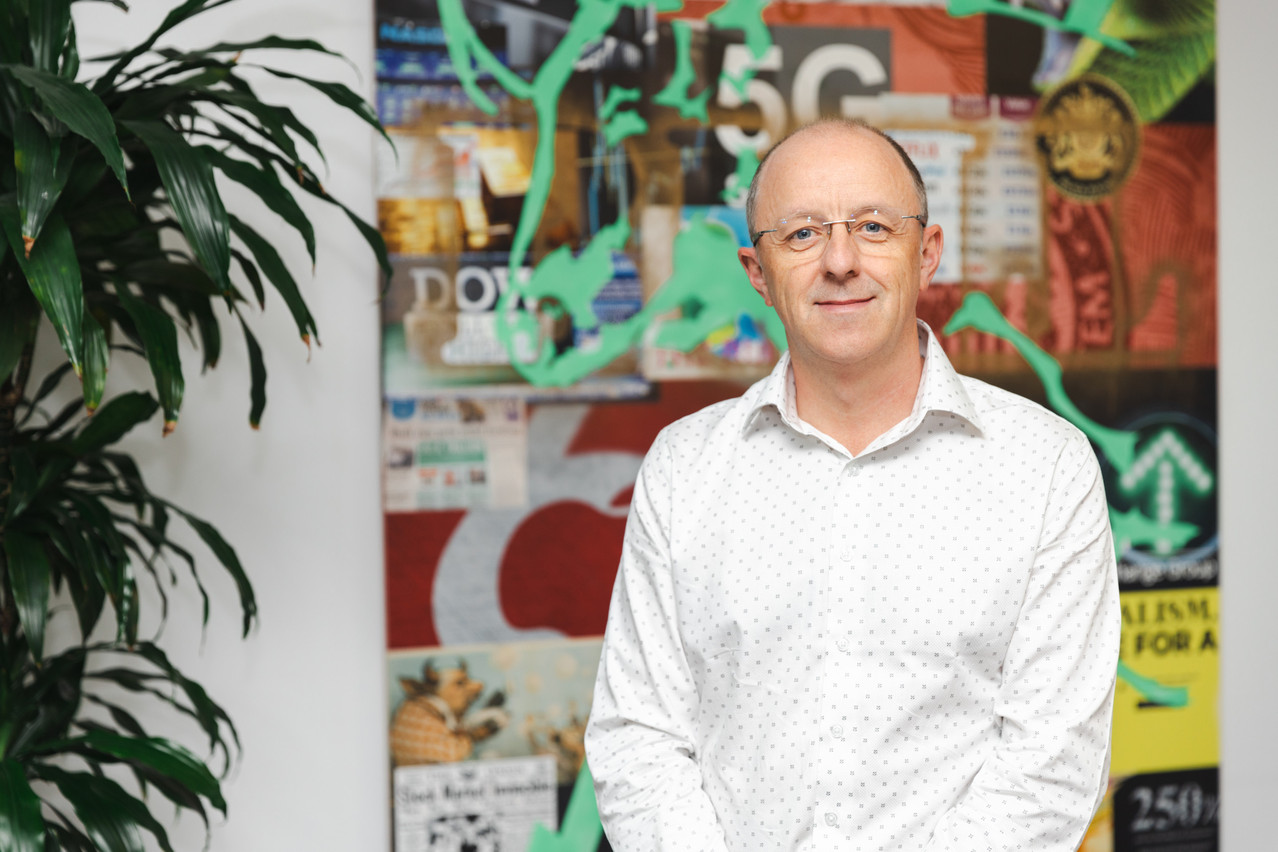Dave Sparvell, who’s from the UK and came to Luxembourg in 2009, is CEO of Swissquote Bank Europe, a bank that specialises in providing online financial and trading services. But Sparvell’s early career as a trader was vastly different from the online trading that is common today.
“That was when you were still using the phones to trade for clients. So, very different to what we see today. I’d have seven or eight telephones in front of me,” he explained during our interview, describing the set-up. “You had to ring the stock market floor for your trades, and you had to pick up your calls from your clients. And of course, you couldn’t have the phones ringing, because you’d go stir-crazy. So you had a lightbulb on the wall, and it would flash when the calls were coming in.”
In the late 1990s, the privatisation of the rail industry in the UK led to the opening of thousands of accounts, and therefore, many more trades. And with more and more people waiting for their call to be picked up, this lightbulb on the wall would flash just a bit more quickly.
“You didn’t know how many people were waiting for you to pick the phone up,” he noted. “This steadily started getting quicker, to a point where we’d come in some days, and the light was just on--it wasn’t flashing anymore. You’re like, ‘Hm. How many people are waiting to do their trade?’”
Twenty-five years later, the online, 24/7 business run by Swissquote looks very different. “Everything is done electronically. We don’t need, frankly, to use phones for the trading side very much.” With digital personal investing platforms like that of Swissquote, “consumers can just log in and do as many trades, as quickly as they want,” said Sparvell. “We run seven days a week, 24/7. That market [the crypto market] doesn’t stop.”
“Leader in the digital personal investing space”
--one of its local competitors--in early 2022. How has this had an impact on Swissquote’s business?
We wanted to be the clear leader in the digital personal investing space for retail consumers in Luxembourg
“We wanted to be the clear leader in the digital personal investing space for retail consumers in Luxembourg, and we had these very complementary client bases--ours was more internationally focused, theirs was more locally focused--so we thought this would be a really good opportunity for us to cement our position as the leader and bring in a more localised client base that would help us grow and be known much more in Luxembourg.”
“We were able to develop some new products that they had that we weren’t offering our clients at the time: options would be one good example,” added Sparvell. “We’ve also been able to give [Keytrade] clients a much broader range of other products: things like securities lending, real-time forex conversion. We actually have, I think, over two million instruments on our platform.”
“But of course, you have to make that accessible and easy for consumers to find.” The platform also has to be accessible to both less-experienced investors and more sophisticated or professional clients, said Sparvell, who added that the acquisition has been “really, really good for us.”
“There’s always a time of adaptation,” he said. When “you change a platform--from apples to pears--it doesn’t matter if it’s better or worse, some customers struggle with that for a few months. We got over that period, and now I think the ex-Keytrade clients are really happy.”
On top of that, “to get the talents and the skills from the Keytrade team, who joined us in May of last year, was a real advantage as well for us.”
Will “winter” in the crypto sphere soon be over?
Luxembourg’s financial sector supervisory commission, the CSSF, , making it the “sole depositary custodian that’s able to offer digital asset custody for funds in Luxembourg.”
Institutionally speaking, that’ll give players quite a bit of confidence that--if they’re thinking about developing and launching a fund--they’ve got certainty on the regulatory space
Things are still in “early stages,” and there’s been “a bit of a winter” in the crypto sphere. There’s no regulatory certainty yet, for instance, but that will come with the Markets in Crypto Assets Regulation (Mica) in 2024.
“Institutionally speaking, that’ll give players quite a bit of confidence that--if they’re thinking about developing and launching a fund--they’ve got certainty on the regulatory space, who the regulated players are--like us--versus what we’ve seen in some of the unregulated space, and some of the carnage we’ve seen with the collapse of players like FTX.”
We’re not relying on anybody else for the custody of digital assets
Sparvell sees some “bright spots” for 2024, such as the halving of bitcoin mining, which means that the mining community building blocks on the blockchain will be rewarded with only half as many bitcoins and resulting in more control of the ultimate supply of Bitcoin.
That being said, bitcoin and ethereum exchange traded-funds (ETFs) haven’t yet been approved by the US Securities and Exchange Commission, said Sparvell, though many think this will come soon, thus giving “mainstream access to cryptocurrencies that we haven’t seen before.”
Self-custody solutions
Swissquote launched its crypto trading services in Switzerland in 2017. “We’ve been doing it for a lot of years now,” noted Sparvell. “We provide self-custody solutions for potential customers, so we’re not relying on anybody else for the custody of digital assets.”
This lack of external reliance on third parties can reassure institutional players worried about hacking and other incidents. “We do the whole thing, end-to-end. We’ve developed our own self-custody solution,” said Sparvell. “I think that’s something that’s a key part of our proposition.”

Swissquote’s self-custody solutions mean there is no need to rely on external third parties. Photo: Romain Gamba/Maison Moderne
In the alternative investment funds space, Swissquote is “waiting and ready” as an approved custodian, but the funds themselves need to get their approval to launch, which “hopefully will come imminently.”
“Technology is in our DNA”
So what makes Swissquote different from other banks in Luxembourg?
“Technology is in our DNA,” answered Sparvell. The bank’s two co-founders were electrical engineers, and “fintech is something we’ve been doing for 25 years. It’s not new; there’s no transformation or digitalisation needed. We already have that. We’ve always offered our products online, digitally.”
We’re held to the highest prudential standards by the regulator
But Swissquote is also a bank. “We’re held to the highest prudential standards by the regulator,” said Sparvell. Traditional banks are not always very good at putting digital platforms for personal investing out on the field, he argued, while investment firms, which are “quite good at putting out digital technology platforms,” don’t have the track record. Swissquote, on the other hand, has the technology element and the banking “pedigree” and “marries up” the two aspects.
“We have a very good relationship here with the regulator,” added Sparvell, and “we were the first bank in Luxembourg to get a virtual asset service provider [VASP] licence,” allowing it to offer cryptoassets to retail consumers.
Looking ahead: multi-currency debit cards and more
The Swissquote group probably has 100 projects going at any one time, noted Sparvell, before citing a few. “We’ve just launched our own crypto exchange, so we’re now able to offer our clients liquidity through our own exchange, as well as other exchanges around the world.”
The bank has also launched securities lending this year. In addition, with the increase in interest rates, people are looking for fixed-term deposit accounts, which are available within Swissquote’s trading platform. Structured product issuance for more sophisticated clients was also launched at the end of October.
“Early in 2024, we have a new multi-currency debit card coming out, and that will be virtual as well,” said Sparvell, thus allowing clients to avoid big foreign exchange charges. It’s a “neat value-added feature.”
“We’ll be ramping up our institutional services next year,” he added. “In the fund space, that’ll be important for us.”
And finally, life insurance provider partnerships are also in the pipeline. “Giving life insurance policyholders access to our online investment platform is something we see becoming popular.”
Dream golf course?
Sparvell is also an avid golfer. Wondering about his dream course? It’s the Sawgrass in Florida, which features the famous “Island Green,” a hole completely surrounded by water. “I’d really like to play that.”
This article was published for the Delano Finance newsletter, the weekly source for financial news in Luxembourg. .




